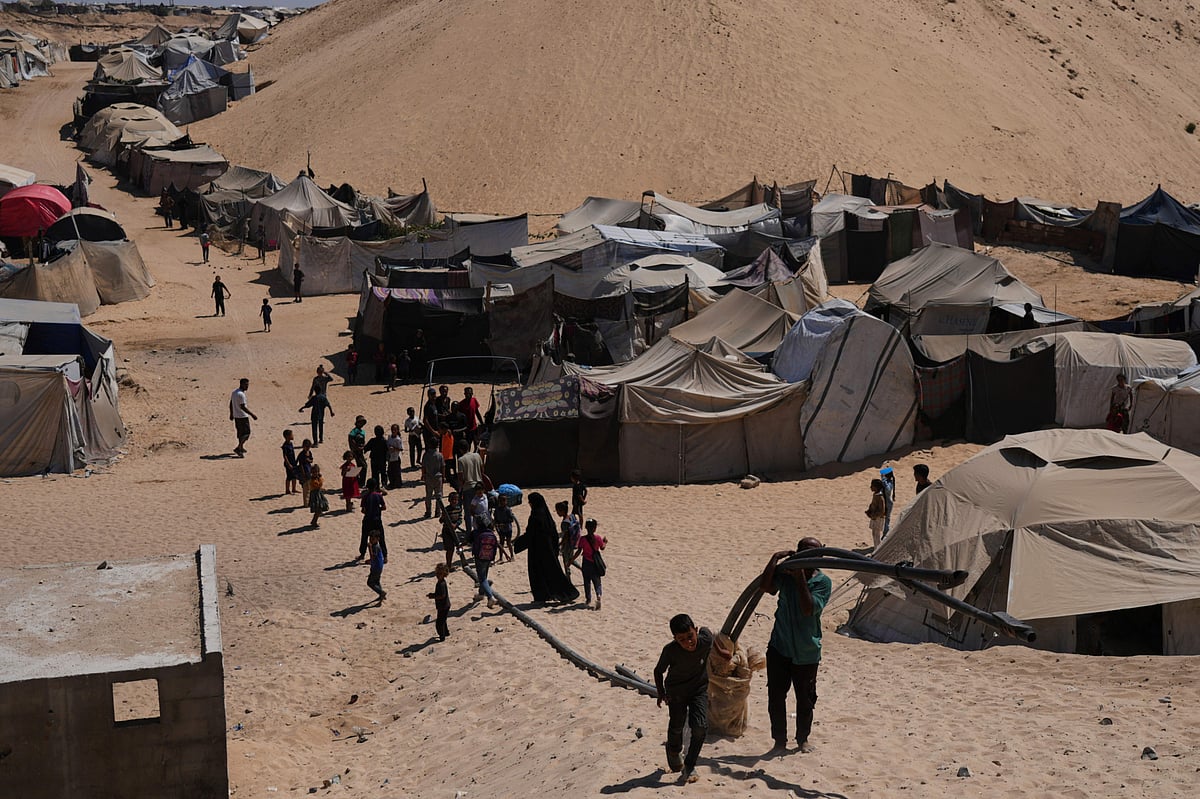Palestine recognition: How Gaza war drove West’s dramatic policy shift
Amid Gaza’s devastation, UK move aims to keep alive hope of peace and two-state solution

London: The devastation of Gaza has triggered a historic rethink in Western capitals, pushing Britain, Canada and Australia to formally recognise a Palestinian state.
Leaders said the scale of destruction and the collapse of peace efforts left them no choice but to act now to preserve the two-state solution.
Prime Minister Keir Starmer announced on Sunday that the United Kingdom was formally recognising Palestine, declaring that “the moment has now arrived.”
His move came just hours after Canada and Australia issued similar declarations, making Britain and Canada the first G7 nations to break with decades of policy that tied recognition to a negotiated settlement with Israel.
Gaza as the catalyst
Starmer framed the decision against the backdrop of Gaza’s humanitarian catastrophe. “In the face of the growing horror in the Middle East, we are acting to keep alive the possibility of peace and of a two-state solution,” he said in a video message. “That means a safe and secure Israel alongside a viable Palestinian state – at the moment we have neither.”
Key takeaways
Britain, Canada and Australia formally recognise Palestine, with France and Portugal set to follow
First time G7 nations (UK, Canada) endorse Palestinian statehood outside a peace deal
Gaza war cited as catalyst, with 65,000+ Palestinians killed and famine declared in Gaza City
Britain invokes Balfour legacy, with Lammy calling recognition a step to correct “historical injustice”
Israel and US condemn move, warning it rewards Hamas and undermines peace talk
Palestinians hail recognition as ending a century of denial of their existence
The Labour leader insisted Hamas would have no role in governing a future Palestinian state and must release hostages still held from its October 7, 2023 attacks.
With more than 65,000 Palestinians killed, vast swathes of Gaza in ruins and famine declared in Gaza City, Western governments have faced mounting public anger. Waiting for peace talks, Starmer argued, risked abandoning the very idea of two states altogether.
Why Britain shifted
Successive UK governments had maintained that Palestinian statehood could only come as part of a negotiated deal. Starmer and his deputy, David Lammy, said that approach was no longer viable given Israel’s hard-line stance and the scale of the war.
Lammy, who will represent Britain at the UN General Assembly this week, also pointed to Britain’s colonial legacy.
The 1917 Balfour Declaration, issued under British rule in Palestine, promised a Jewish homeland while pledging to safeguard Palestinian rights — a commitment critics say was never honoured. Recognition, Lammy argued, was an overdue step to correct that imbalance.
The Balfour Declaration
Date issued: November 2, 1917
By: Arthur James Balfour, then British Foreign Secretary
Content: A letter to Lord Rothschild pledging British support for “the establishment in Palestine of a national home for the Jewish people,” while stating that nothing should prejudice the rights of existing non-Jewish communities.
Impact: Formed the basis of British Mandate policy in Palestine after World War I.
Legacy: Seen by many Palestinians as the starting point of their displacement; seen by Israel and Jewish communities as a foundation for statehood.
Domestic pressure has also grown. Opinion polls show strong support among young Britons for Palestinian statehood, and mass demonstrations have filled London’s streets throughout the war.
Canada and Australia follow
Canadian Prime Minister Mark Carney said Ottawa recognised Palestine “to preserve the possibility of a two-state solution, to not allow the facts on the ground… to get to such an extent that this is not possible.”
Australia echoed the move, with Foreign Minister Penny Wong citing Gaza’s devastation and Israel’s expanding West Bank settlements as threats to peace. Portugal confirmed it would also recognise Palestine, while France is expected to announce its recognition at the UN summit in New York.
Backlash from Israel and US
The recognitions drew swift condemnation. Israeli Prime Minister Benjamin Netanyahu said they “would endanger our existence and serve as an absurd reward for terrorism.” He vowed to oppose the initiative at the UN.
US President Donald Trump also voiced disapproval during a state visit to London last week. “I have a disagreement with the prime minister on that score,” he said. Trump later warned Canada that recognition “will make it very hard” to finalise new trade deals with Washington.
Critics argue that recognition rewards Hamas and is meaningless given Palestinian political divisions between the West Bank and Gaza.
Palestinians hail historic move
Palestinian officials welcomed the shift as a diplomatic breakthrough. Husam Zomlot, the Palestinian envoy to London, said it ended “the denial of our existence that started in 1917.”
Palestinian Foreign Minister Varsen Aghabekian Shahin told AFP: “Recognition is not symbolic. It sends a very clear message to the Israelis on their illusions of continuing their occupation forever.”
A watershed moment
More than 140 UN member states already recognise Palestine, but until now no G7 nation had done so. Britain and Canada’s decisions mark a significant break with the past, and with France set to follow, momentum is building.
For Palestinians, it is a long-awaited diplomatic victory. For Israel and the US, it represents a rupture with close allies. And for Britain, it is both a reckoning with history and a recalibration for the future — recognition born not of negotiation, but of Gaza’s tragedy.
Sign up for the Daily Briefing
Get the latest news and updates straight to your inbox
Network Links
GN StoreDownload our app
© Al Nisr Publishing LLC 2026. All rights reserved.
